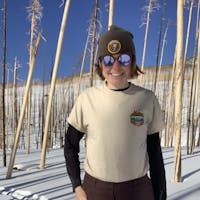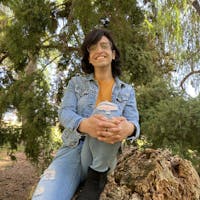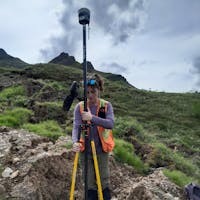The Scientists in Parks program provides immersive, paid full work experiences with the National Park Service in natural resource fields so the next generation of park stewards—especially those underrepresented in science—have an opportunity to work on important and unique projects while building real-world professional experience and a life-long connection to America’s national parks. Positions can last from 3 months to one year and are all full time, AmeriCorps positions.
Eligibility and Applying
For more information, please visit our Eligibility and How to Apply pages.
- Each position accepts up to 75 applications before closing. If positions are approaching the cap, it will be noted in the position title.
- Allowed to apply for up to five positions per season. Please note, a new application is needed for each position if you are applying to multiples.
- Only apply to positions if you are sure you can commit to the position dates and full length.
Summer: applications open in early December and close mid-January. Position start dates occur between May and September.
Winter: applications open in early May and close mid-June. Position start dates occur between October and April.
Program Values
SIP welcomes aspiring professionals to apply and we invite the full participation of individuals currently being underserved in STEM career fields. This includes, but is not limited to, individuals from racially and/or ethnically diverse communities, individuals with disabilities, individuals from LGBTIQ+ communities, and individuals who experience intersectionality with one or more of these identities.
The Scientists in Parks program is a collaboration between Stewards Individual Placements (a program of Conservation Legacy), the National Park Service, Ecological Society of America, and the Geological Society of America.
Summer 2025 Position Listings Table
If you would like to sort and filter the summer 2025 positions by specific keywords, please download this table.
*DISCLAIMER: This table includes positions as of 12/9/2024 and is not a live version. Position details may change and positions in this table may close before you apply. Please double check the actual position description by clicking on the openings below as those are live and updated frequently.

Allison Culliney
Education Assistant
“ I have been interested in working for the NPS for much of my life, and this internship gave me real experience with the organization. ”

Zerxes Bhada
Night Skies Assistant
“ I take particular pride in the fact that I never left until I was confident that people were more excited about astronomy than they were when they came. ”

Nicole Benshoff
Geology Assistant
“ I loved learning about the park as a whole, how one process is connected to another, and how humans are affecting these processes. ”
%HEADER_OUR_OPENINGS%
%LABEL_DEPARTMENTS%
%LABEL_COUNTRIES%
%LABEL_LOCATIONS%
%LABEL_REMOTE%
Biological Sciences
Biology Assistant - AmeriCorps
Biology Assistant - AmeriCorps
Biology Assistant - AmeriCorps
Biology Assistant - AmeriCorps
Biology Assistant - AmeriCorps
Biology Assistant - AmeriCorps
Biology Assistant - AmeriCorps
Biology Assistant - AmeriCorps
Biology Assistant - AmeriCorps
Biology Assistant - AmeriCorps
Biology Assistant - AmeriCorps
Biology Assistant - AmeriCorps
Ecology Assistant (DHA) - AmeriCorps
Ecology Assistant - AmeriCorps
Ecology Assistant - AmeriCorps
Ecology Assistant - AmeriCorps
Ecology Assistant - AmeriCorps
Ecology Assistant - AmeriCorps
Ecology Assistant - AmeriCorps
Ecology Assistant - AmeriCorps
Ecology Assistant - AmeriCorps
Ecology Assistant - AmeriCorps
Ecology Assistant - AmeriCorps
Ecology Assistant - AmeriCorps
Ecology Assistant - AmeriCorps
Ecology Assistant - AmeriCorps
Ecology Assistant - AmeriCorps
Ecology Assistant - AmeriCorps
Ecology Assistant - AmeriCorps
Ecology Assistant - AmeriCorps
Ecology Assistant - AmeriCorps
Ecology Assistant - AmeriCorps
Ecology Assistant - AmeriCorps
Ecology Assistant - AmeriCorps
Ecology Assistant - AmeriCorps
Ecology Assistant - AmeriCorps
Ecology Assistant - AmeriCorps
Ecology Assistant - AmeriCorps
Ecology Assistant - AmeriCorps
Ecology Assistant - AmeriCorps
GIS Assistant - AmeriCorps
Natural Resource Management Assistant (DHA) - AmeriCorps
Natural Resource Management Assistant - AmeriCorps
Natural Resource Management Assistant - AmeriCorps
Natural Resource Management Assistant - AmeriCorps
Natural Resource Management Assistant - AmeriCorps
Natural Resource Management Assistant - AmeriCorps
Natural Resource Management Assistant - AmeriCorps
Natural Resource Management Assistant - AmeriCorps
Natural Resource Management Assistant - AmeriCorps
Natural Resource Management Assistant - AmeriCorps
Natural Resource Management Assistant - AmeriCorps
Natural Resource Management Assistant - AmeriCorps
Natural Resource Management Assistant - AmeriCorps
Natural Resource Management Assistant - AmeriCorps
Natural Resource Management Assistant - AmeriCorps
Natural Resource Management Assistant - AmeriCorps
Natural Resource Management Assistant - AmeriCorps
Planning Assistant (DHA) - AmeriCorps
Science Communication Assistant - AmeriCorps
Science Communication Assistant - AmeriCorps
Science Communication Assistant - AmeriCorps
Communication and Education
Astronomy Assistant - AmeriCorps
Astronomy Assistant - AmeriCorps
Astronomy Assistant - AmeriCorps
Astronomy Assistant - AmeriCorps
Astronomy Assistant - AmeriCorps
Astronomy Assistant - AmeriCorps
Astronomy Assistant - AmeriCorps
Education Assistant - AmeriCorps
Education Assistant - AmeriCorps
Education Assistant - AmeriCorps
Education Assistant - AmeriCorps
Education Assistant - AmeriCorps
Interpretive Assistant - AmeriCorps
Interpretive Assistant - AmeriCorps
Interpretive Assistant - AmeriCorps
Interpretive Assistant - AmeriCorps
Night Skies Assistant - AmeriCorps
Science Communication Assistant (DHA) - AmeriCorps
Science Communication Assistant - AmeriCorps
Science Communication Assistant - AmeriCorps
Science Communication Assistant - AmeriCorps
Science Communication Assistant - AmeriCorps
Science Communication Assistant - AmeriCorps
Science Communication Assistant - AmeriCorps
Science Communication Assistant - AmeriCorps
Science Communication Assistant - AmeriCorps
Science Communication Assistant - AmeriCorps
Science Communication Assistant - AmeriCorps
Science Communication Assistant - AmeriCorps
Science Communication Assistant - AmeriCorps
Science Communication Assistant - AmeriCorps
Science Communication Assistant - AmeriCorps
Physical Sciences
Acoustic Assistant - AmeriCorps
Cave and Karst Assistant - AmeriCorps
Ecology Assistant - AmeriCorps
Ecology Assistant - AmeriCorps
Ecology Assistant - AmeriCorps
Ecology Assistant - AmeriCorps
GIS Assistant - AmeriCorps
Geology Assistant - AmeriCorps
Geomorphology Assistant - AmeriCorps
Geomorphology Assistant - AmeriCorps
Geomorphology Assistant - AmeriCorps
Geomorphology Assistant - AmeriCorps
Hydrology Assistant - AmeriCorps
Hydrology Assistant - AmeriCorps
Hydrology Assistant - AmeriCorps
Hydrology Assistant - AmeriCorps
Natural Resource Management Assistant - AmeriCorps
Natural Resource Management Assistant - AmeriCorps
Paleontology Assistant - AmeriCorps
Paleontology Assistant - AmeriCorps
Paleontology Assistant - AmeriCorps
Paleontology Assistant - AmeriCorps
Paleontology Assistant - AmeriCorps
Paleontology Assistant - AmeriCorps
Paleontology Assistant - AmeriCorps
Paleontology Assistant - AmeriCorps
